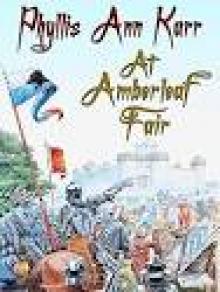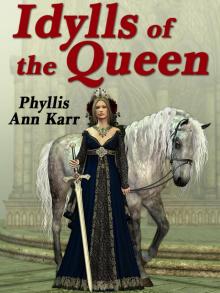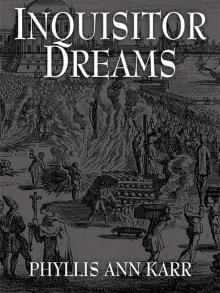- Home
- Phyllis Ann Karr
At Amberleaf Fair Page 2
At Amberleaf Fair Read online
Page 2
“Aye.” Old Vathilda discarded the used rag for a clean one. “But what’s his sickness? Tell us that, Toymaker, and we may save his breath yet.”
Torin shrugged helplessly.
“It started a few moments ago,” said Sharys, “over nuts and brandy. Oh, Uncle Talmarak!” She knelt and groped for the wizard’s other hand.
Torin glanced at the feast table, caught sight of the skyreader and the judge.
“He was demonstrating a new trick with his globe,” said Vathilda.
Torin saw the globe now, partly blocked from his sight by crystal bowls of nuts and crisps. The purple-robed skyreader Laderan sat staring into it, prodding it with one finger. Judge Alrathe moved quietly along the other end of the table, sniffing the foods and drinks.
“He boasted it would earn him the third syllable to his name,” Vathilda went on, “or promotion to the silver robe, or both.”
Talmar tried to speak but instead heaved up again, pulling his hand from that of Sharys, and hacked into Vathilda’s rag.
“So that’s livecopper madness.” Laderan gave the globe another gingerly prod.
“If it is that,” said Alrathe.
Talmar shook his head, fell back, and croaked, “I’m sane.” He felt for the young conjurer’s hand again.
“And I don’t call it a matter of simple power exhaustion,” said Vathilda. “You grew up beside him, Toymaker. Did he ever fall to the boasting sickness, the Choking Glory? Or daydreams and nightmares dropping into his lungs?”
Torin shook his head, searching his memory. Daily life with his brother had ended twenty years ago, when Torin left home at the late prentice age of fifteen while Talmar stayed to learn the family calling from their father.
“It resembles lung congestion,” Alrathe suggested.
Vathilda’s daughter Hilshar spoke for the first time. “But why now, when not during the dust seasons?”
“Yes!” said Torin. “Once, the night of his First Name-Lengthening—very much like this.”
“No! Not—” The force of Talmar’s protest brought on another fit of choking.
Torin pressed his hand. “But not so severe.”
“And it passed?” said Sharys.
“Of itself, or with healing?” said Vathilda.
Again Torin shrugged. “No… It might not have been the same thing.” He thought he lied. The event, being less than pleasant to himself, had been stubborn in returning to his memory; but now he felt sure Talmar’s fit then had been very similar. He also guessed the reason for Talmar’s denial: First Name-Lengthening, pride in new apprenticeship, the boasting sickness. Already Vathilda’s expression showed confidence that she was right. And when people suffered the Choking Glory, then, for the sake of their health, their comrades did not honor, but humbled them instead. Talmar was proud—too proud to confess the fatal weakness. Torin’s own lungs felt divided—perhaps he increased the danger in trying to help disguise Talmar’s pride; but perhaps, also, Talmar would prefer this death to the choking of his ambition. Besides, as nearly as Torin could recall, their mother had concentrated on mind-calming techniques that night. “Both our parents were there,” he went on. “Father a high wizard and Mother a mage.”
Talmar squeezed Torin’s fingers and choked out, “My globe!”
“Forget your globe,” said Vathilda. “Remember Irvathel’s poem: ‘Each of us is less than the lightest flake of paper ash.’ Rest in—”
“My globe!” cried Talmar, and fell forward coughing more harshly than ever, dropping both Torin’s hand and that of Sharys.
Torin rubbed his brother’s back. “What is your new technique?” Flattery might soothe better than poetry.
Vathilda shrugged. “A toy to please young conjurers.”
“It isn’t!” said Sharys. “It’s a wonderful achievement, Uncle Talmarviak! He’s invented a way of seeing the past,” she explained to the toymaker.
“Only so much as the globe itself was there to see,” said Vathilda.
“My globe!” Talmar insisted again.
“Brother Skyreader,” Vathilda said with a sigh, “bring his globe.”
Laderan brought it. Talmar sat back shakily, took the globe into his lap and, steadying it with his left fingers, caught Torin’s hand and began moving it over the curved glass.
The toymaker tried to pull away. Talmar squeezed tighter, choked, closed his eyes and choked again. The veins in his forehead bulged, making his face even more painful to look at. Torin felt the mind-message tapping at his brain, punctuated by spasms: “Our family trade. Fifteen generations of magic-mongers. You the last—”
“No!” Torin jerked his hand from Talmar’s grasp and shut his mind to the message. At once he regretted the reflex. Why not soothe his brother for once with a false promise? Keeping his brain closed to further mental messages, he put his hand back in Talmar’s. “All right, brother, stop straining yourself. I’ll…consider it. Teach me the new gesture.”
With something between a wheeze and a hard sigh, Talmar guided his older brother’s hand in new and intricate finger work. When he lifted their hands away, all reflected images stilled in the globe and then began to move in reverse. Distorted fingers and palm remained large, repeating the new gestures from finish to start, lifted away to show Torin’s brief refusal to learn this technique, returned momentarily for that abortive first start. Laderan’s reflected hands came back as if covering the globe, and though in fact it lay unfingered in Talmar’s lap, in imagery it seemed to be back in the skyreader’s grasp.
Torin became aware that Sharys, Hilshar, Laderan, and even old Vathilda for all her show of scorn were watching with equal fascination. So, he sensed, was Judge Alrathe, who had come up behind him. Talmar started to sigh as in triumph, coughed again and covered his own mouth to choke the fit.
The image of Laderan’s hands lifted away, and now the globe showed the view it would have reflected as it sat on the table a few moments ago, with everyone moving backward.
“Marvelous!” Torin assured his brother. Talmar had dreamed since childhood of accomplishing something like this. “So you’ve done it at last! Wonderful!”
“Oh, aye,” said Vathilda.
Talmar bent forward in another ugly seizure.
“And much good it’ll do him,” Vathilda went on, “if he dies before presenting this for another syllable and higher rank. Toys, all toys.” Holding her rags to his mouth, she motioned for Hilshar to massage his back.
Even in his throes, Talmar was trying to press his globe into his brother’s hands.
“You aren’t dead yet,” Torin was telling him over and over, pushing the globe back to him. “You’ll recover again. This is passing, you’re far from ripe for harvest.”
Talmar gulped enough breath to choke out, “Elm!” He had never changed his boyhood choice of tree to grow from his grave.
“Yes, elm, eventually,” Torin agreed, “but not for years. You’ll probably plant mine first.”
“Here!” said Vathilda. “Take his precious globe before it rolls away and smashes.”
“I’ll take it.” Glad of the excuse, Torin slipped his hands round the globe, stood, and crossed the little stream over which they had positioned this tent.
As he reached the table, the doorcurtain softened and swept back. Iris came in, with Ulrad close behind.
“I have rightful business,” said Ulrad. “Ah, there you are, Toymaker.”
Torin set Talmar’s globe down with exaggerated care. “Brother Merchant,” he said, ashamed to think or ask, with his brother between breath and harvest, who was left watching his own booth.
Ulrad started to hoist a filled bag, paused, and flushed, looking toward the sick man. Torin followed his glance and saw Talmar’s eyes closed and forehead veins bulging.
“Aye, yes,” said the merchant. “Well, let it wait, Brother Toymaker.” He had to speak above Talmar’s coughs. “I’ll bring the payment along to you this evening, tomorrow morning at latest.” He began to back out,
glanced around, and said, “Yes, this evening then. Uh, the curtain?”
“It is stiff only to keep unwanted people from coming in,” said Vathilda.
Ulrad touched the curtain, it softened at once, and he hurried out. The sounds of Talmar’s labors for breath filled the tent.
Torin realized that Iris was telling him something he felt anxious to hear. “What?” he asked.
“That storyteller happened to come by—Dilys. She said she’d watch your things until you came back.”
Torin nodded. “I should go back long enough to move everything inside my tent, tie it up…”
“I’ll go,” said Hilshar. “Where do you keep your charm when it isn’t across your door?”
“Around my moneybox.”
Torin took Hilshar’s place behind the chair, she passed him the moistened compress and left the tent. He could trust Dilys; though he did not like the way she had let Ulrad and probably Kara walk off with their chosen purchases on trust, yet there were witnesses and Ulrad had already made one attempt to pay. He could also trust Hilshar, both as a neighbor and as a magician. Any student of magic above conjurer’s rank could tie and untie a charm against thievery as well as could the charm’s owner. Such skill required trustworthiness, so a magic-monger who stole was subject not only to judge’s discipline but also to that of the Elder Mage. Magic-mongers might try to cheat openly, but even the most impoverished seldom risked stealing.
Moments afterward, as Torin stroked his brother’s forehead with the cool cloth, he realized that by giving him a healer’s task, no matter how simple, Hilshar might have been working with Talmar’s desire to transform the craftsman back into a student of magic.
Torin shook his head slightly. It would not hold, Talmar, he thought—thought without attempting any mind-message. Fifteen generations of magic-mongers or not, I was born a toymaker.
He looked at the table. Many of the bowls, goblets, bottles, and plates had turned back to wood and clay, and the cloth was returning from silk to frayed linen, beginning with its silverlace edge. Usually the tableware stayed luxurious all day, sometimes two days without recasting the spell. At a time like this, when so much energy was spent elsewhere and so much concern filled the atmosphere, the first or second jar could shiver an unused, ignored item back into its true form. Even some of the delicacies had changed back—citrons to small potatoes, dewmelons to cabbages—and food transformations were generally more stable. One theory was that the longer anything had been harvested, the less permanently it would take transformation; but there were enough exceptions that the opposite had been argued. Another theory proposed that the more time and energy spent casting the transformation, the longer it would last. The opposite of that had also been suggested, perhaps in joke though it sometimes did seem to hold true, as Torin had experienced with some of his own accidental spells. The more study this area received, the narrower its generalities appeared. The practical results were that while magic-mongers could live in seeming luxury despite actual poverty, their transformations were almost never permanent. The terms of impermanence tended to be unpredictable and subject to infinite variables, so they could rarely earn honest money selling the fruits of this power, and even the magic-mongers themselves preferred real to transformed items. Which was as well for the crafting classes.
Judge Alrathe sat in Laderan’s former place, nibbling rare whitenuts as they turned back into parched corn, and watching Talmar’s globe very intently.
Chapter Two
At thirty-five years old, one did not often find oneself Senior Storycrafter at any fair larger than thirty-five tents. This Amberleaf Fair had forty-nine tents, not counting the animal shelters. Dilys liked to suspect that some of her mentors had made their excuses of minor illness, distance, or desire for rest in order to give her this experience.
She relished it all: choosing a pavilion site at the edge of the grounds, hanging lanterns in the forest to create an artistic play of shadows on cloth walls, scheduling those adventurers who wanted to sell their tales between herself, Brinda, and Kivin. Four of the adventurers were older than Dilys, and Torin’s friend Valdart was the same age, and that made her job even more enjoyable. Settled storycrafters always held authority over wanderers, who told tales only as a byproduct of their travels.
She delighted in overcoming the temptation to schedule everyone else so as to make herself seem a single bright aster in a garland of small leaves, culling the pattern instead to make each teller appear a blossom, set off or complemented by predecessor, follower, and hour of day. She was not so adept as her teacher Belvador at this arranging, but she was not ill pleased with her results. Long tradition gave the choice evening hours to Senior Storycrafter, so she could take them with her mind easy. She had stepped onto the platform at twilight five times before now in her life, but two of those occasions were when the Senior fell sick unexpectedly and three at gatherings so small a platform seemed pretentious. At all other fairs and festivals she had told her tales by daylight or midnight.
There were a few spots of mildew on her first full day of glory. But she had known since early last spring that Torin thought he loved old Vathilda’s granddaughter. Dilys believed it a mistake, but she had adjusted well enough to feel capable of leaving them—Torin, Sharys, and now Valdart—to disentangle their own problem. If she hoped Sharys would persist in choosing Valdart, and blushed for that hope—because her objective reaction was that the adventurer would make Sharys a worse chosen than the toymaker—at least she could keep her opinions secret.
She had had less time to assimilate High Wizard Talmar’s sickness. But Torin’s brother was important to her only as Torin’s brother and a fellow creature. The lack of amiable qualities Talmar had shown her over the years had kept them polite acquaintances, careful to stay outside the exhalations of each other’s lungs. As nearly as she could observe, the wizard was even less amiable to his sibling. Perhaps because Dilys could not like Talmar, she found it difficult to believe his danger was mortal. Those first rumors had inspired her to stroll past Torin’s booth again. Iris called Talmar’s situation grave, but the apprentice skyreader liked to puff every little excitement. Hilshar had spoken with much greater optimism. True, Hilshar had come to tie all Torin’s things behind his charm against thievery, which errand implied that the wizard was sick enough to cost his brother half a day of fair business. Nevertheless, the storycrafter preferred to believe that a magician, with magic-monger’s insight into healing, gave a more trustworthy statement than an excitable young skyreader.
So Dilys used Talmar’s problem as an exercise to drain her attention from her own platform nervousness, and hoped the toymaker would still be able to come and hear her. Returning from his booth, she stopped at the story pavilion and listened with keen satisfaction to part of Kivin’s performance, then slipped to her own tent, ate a small supper, washed her mouth and upper body and changed her tunic. Bright embroidery helped stir interest in your storytelling as you walked about the fair, but simple duskwhite was better when you sat on the platform telling your tales, framed by the sides of the old carved darkwood chair and shadows of trees with their last autumn leaves falling on the tentcloth behind you. Give your audience just enough to look at without distracting them from what they herd. She went back gently to the pavilion.
Torin had not come for her tales.
She could not have failed to see him. The adventurer Rondak had preceded her. All but two of his listeners remained, and Kivin’s young sister Kip collected the moneygems they gave to hear the next teller, while almost thirty more came, paying at the entrance, as Dilys trailed out her bait-tale. In all, she gathered seventy-three, an excellent-sized audience, more than half the people present at this Amberleaf Fair, but not so large that a dearly familiar face could blend into anonymity. Her listeners had ample room to spread their cushions, and even in muted dusk she had a good overview from the platform.
Folding away her disappointment, she began the time-venerated saga of Ilft
ing the Dwarf. But she decided to omit her own tale of how he rescued one of Thyrna’s brightwings. She had first tried that tale on Torin in a private storytelling the earliest year of their friendship, so by leaving it out tonight she in some way both paid him for not coming and saved it for him in case he came on the middle or last day of the fair. Fortunately, Ilfting tales both old and new were so many that a cycle could be tailored to any length around the three basic events of his birth, his climbing of the Teln-tree, and his death.
By her listeners’ silence, their upturned faces, and the way they changed position only between episodes, she knew she had succeeded in hiding her own hurt; and by the time Ilfting neared Teln-top she herself was unaware of any events in her personal life. Dusk became full dark, limned by lantern-cast shadows on tent walls and pricked by the candles that flanked storyteller’s chair and listeners’ entrance. Her audience swelled from tale to tale as more fairgoers chose to enter the carpeted area, Brinda lowering the payment to fit the length of time that remained. The autumn moon, nearly half full, rose high enough to lend its glow to pavilion walls and roof.
Dilys was beginning the last tale when Torin came after all. She saw his honey-brown hair as he bent over Brinda’s table to learn the adjusted price, his brown hand as he rolled a carved stone into the cloth-lined box. So careful with his moneygems, he nevertheless paid for cushion space when only the end tale of her performance remained.
She did not break her narrative flow, but she fitted in the episode of the brightwing’s rescue, putting it into Thyrna’s greeting when the spirit came to harvest the dwarf. It worked very smoothly.
“So Ilfting died with his eyes closed,” she ended, “and a great goldentree grew from his grave. Thyrna’s brightwings played among its branches for many generations.”
She rose and bowed. Now that her performance was done and the audience singing an enthusiastic song of applause, she directed one slight, uncraftish nod at the toymaker before descending and leaving through the tellers’ door behind the platform.

 The Gallows in the Greenwood
The Gallows in the Greenwood At Amberleaf Fair
At Amberleaf Fair Frostflower and Thorn
Frostflower and Thorn The Fanciers & Realizers MEGAPACK
The Fanciers & Realizers MEGAPACK All But a Pleasure
All But a Pleasure The Idylls of the Queen
The Idylls of the Queen Frostflower and Windbourne (Frostflower & Thorn)
Frostflower and Windbourne (Frostflower & Thorn) Inquisitor Dreams
Inquisitor Dreams